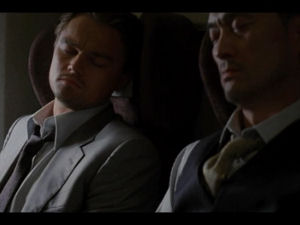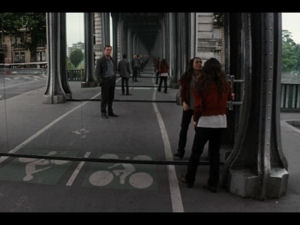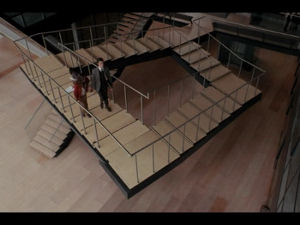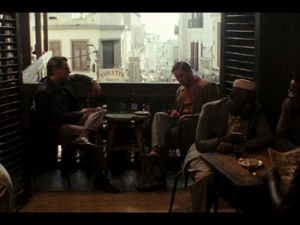What Inception is About
 | | It just sits there, spinning in place |
As if you didn't know, there was a movie that came out last year called Inception. This trippy sci-fi adventure--think The Matrix meets Dreamscape--was a commercial success and a cultural milestone among geeks. It even got an Academy Award nomination. However, the prevailing opinion of professional movie critics is that the film is a lot of technically impressive spectacle that is ultimately mindless, a lot of sound and fury, signifying nothing. David Denby at The New Yorker calls it "a stunning-looking film that gets lost in fabulous intricacies, a movie devoted to its own workings and to little else." "At the end of Inception," writes Dana Stevens at Slate, "I hadn't lived through the grueling emotional journey Nolan seemed to think I had, but I'd seen a bunch of cool images and admired some technically ambitious feats of filmmaking." In all the reviews I've heard, read, and seen, I have yet to come across anybody willing to make the case that there is a deep, artistic meaning beneath all the cool effects and mind-bending action sequences. That is why I am here, to tell you that there absolutely is.
If you haven't seen the movie, just stop reading this now, because you're not going to understand what I'm going on about here. If you have seen the movie, but you weren't able to follow the complex ins and outs of the plot, this isn't going to help you. I'm not interested in explaining the narrative itself--in tracking the multiple dreams within dreams or discussing the underlying rules of Christopher Nolan's universe--but there are plenty of other places on the Internet where you can go for that sort of thing. No, I'm here to talk about what it all means, about the very real subtexts and themes within Inception. I must warn you, I'm going to be delving pretty deep here and hopefully blowing your mind, so be prepared.
Level 1: It's about Dreams
 | | Merrily merrily merrily merrily |
The most basic interpretation of the narrative is that it's about dreams, that the theme has something to do with how difficult it is for us to tell the difference between dreams and reality. This is probably as deep as the aforementioned critics are willing to look, and if that were all there is to Inception, I would agree that the film belongs in the same category as Avatar, a truly amazing feat of filmmaking that doesn't chart any novel storytelling waters.
Exploring the illogic of dreams is nothing new. Shakespeare did it in A Midsummer Night's Dream, and movies have been doing it for practically a century. Inception uses state of the art effects to portray dreams on film as we've never seen them before, showing us imaginative images of buildings folding in on themselves, men fighting in a rotating hallway, and an expansive, decaying city that could only exist in a universe that obeys different rules. However, the story's interpretation of dreams is superficial at best, offering no real insight into the psychology or metaphysics of dreaming.
You could make the case that there is, within the movie, an emotional story about a man, Cobb, dealing with the guilt over his wife's suicide, and what happens to a person when even his dreams have turned sour. There is a poignant melodrama in there somewhere, but like the imagery, it's really just set dressing for the message Christopher Nolan is trying to get across.
In order to understand that, we're going to have to go deeper.
Level 2: It's about Filmmaking
 | | Ah, mirrors within mirrors; I see what you did there |
Inception is about a group of people creating a false reality in order to fool somebody. They have to build new worlds out of their own imaginations that are convincing enough to do what they want them to do; they spend ludicrous amounts of time planning, discussing, and simulating; they have to secure funding from a company that has its own agenda and set of ideas; and if they mess it up, the illusion will collapse. At the head of this team of world-builders isn't Leonardo DiCaprio's Cobb, but Christopher Nolan, the director. That's right. In an appropriately meta turn of events, the film's plot mirrors the creation of the film itself.
Film students sometimes come across the concept of the "suture effect," as epitomized by the independant flick Suture, in which President Palmer is mistaken for a white guy in order to make the point that we are all transformed whenever we connect with a good movie. In brief, an audience is "sutured" to a film when the suspension of disbelief is strong enough to make us forget that we're watching a movie, even if it's just for a second. Good narrative filmmaking, therefore, is all about maintaining the suture effect as long as possible (unless you're a Brechtian or a fan of the French New Wave, in which case I have nothing to say to you).
I bring this up because the plot of Inception deals very heavily with the suture effect. Cobb and his team must convince their target, Cillian Murphy's Robert Fischer, that his mind isn't being infiltrated by Cobb and his team. In order to do that, they have to create a dreamworld that is totally convincing, and if Fischer even suspects that there's something weird going on, the façade will collapse and the mission will fail. In other words, they have to maintain a suture effect with Fischer as long as possible, even having to go the meta route at one point to achieve it (by convincing Fischer that his mind is being infiltrated by somebody else).
There are plenty of details within the story to back up this interpretation. For example, there is the scene in which Arthur leads Ariadne through the Penrose steps, a paradoxically infinite staircase. Arthur explains that this is not only possible in dreams, but sometimes necessary in order to keep the target trapped in an illusion. In the same way, every film you've ever seen has to resort to trickery--be it visual, narrative, or otherwise--in order to be convincing. Cobb also explains at one point that you should avoid basing a dream on a real place, because it is much harder to maintain the illusion, which is, of course, also true in filmmaking.
What are we to make of Mal then, Cobb's murderous dead wife who shows up whenever Cobb tries to do anything? Some filmmakers get stuck with their own idiosyncracies, unable to resist doing certain things in all of their films. Think of how Tim Burton can't make a movie these days without it being about how much he wants to have a three-way with Johnny Depp and Helena Bonham Carter, how Oliver Stone can't make a movie without there being some insanity thrown in, how Quentin Tarantino is incapable of inserting a single frame of originality into his films, or how Tony Scott can't have a climax without there being some form of Mexican standoff. Mal, then, is like Ridley Scott's Russell Crowe, a thing that was once great but now shows up all the time to suck all the joy out of an otherwise good piece of work by stabbing you in the gut and pretending to be Robin Hood.
Still, that's not the bottom of this story. We can go even deeper.
Level 3: It's about Storytelling/Entertainment/Art in General
 | | Art imitates art |
There's really no reason to restrict the theme to filmmaking, because there are dozens of ways to tell stories. Consider the scene where Yusuf leads our heroes into a room where people spend several hours a day in a forced dream state, escaping from reality. Isn't that the nature of all forms of entertainment? Think about it. Why do old people watch Matlock and Law & Order for hours on end? Is it the only way they can still dream, or do they watch these shows to wake up? How many hours a day does the average person spend watching television and movies, reading books and magazines, going to sporting events and music concerts, and playing video games? Does it sometimes feel like an hour of time spent reading an engrossing novel is longer and richer than an hour spent doing something else, even though, in reality, you've accomplished nothing?
Inception explores these ideas unflinchingly. Indeed, the Penrose steps aren't unique to film--they are most iconically used in a work of art by M.C. Escher--and suspension of disbelief is just as important in theater as it is on the silver screen. It's easy to say that Inception is uniquely about film, since it is a film, but it's just as easy to extrapolate its ideas into other modes of entertainment. Why else would Nolan consciously use iconic imagery from other artforms? In fact, you could look at the Penrose steps as an example of art within art, an M.C. Escher image plastered onto celluloid.
Therefore, you could look at Inception as an exploration of art within art, of stories within stories and dreams within dreams. It doesn't seem like much of a stretch, but it doesn't actually address why Nolan would choose to explore these motifs. In order to fully appreciate that, we have to carve away all the fat and get at the root of the story. We have to peel back the curtain and ask not only why Nolan is telling this story but why anybody tries to tell any story. We have to go as deep as we possibly can.
Level 4: It's about Human Communication
 | | I want you to play Bane, but before you say it's impossible... |
Have you ever noticed how hard it is to change somebody's mind? Of course you have; you're on the Internet. The reason for intellectual intransigence--something we are all guilty of--is that we tend to take ownership of our ideas, no matter where they ultimately come from. Through our various experiences and the things we are exposed to, we form thoughts and opinions of the world that we treat as uniquely ours. When we debate each other, it is hard because we can take argumentative challenges as personal affronts, thus resorting to all the various logical fallacies we need in order to ensure that we don't have to change our minds.
What makes this so unusual is that even our most cherished ideas often come from completely arbitrary sources. Maybe you read it somewhere in a book or saw somebody say it in a television show once, but every once in a while, we are exposed to an idea that resonates with us for whatever reason and then we subsequently defend that idea as though we gave birth to it. Every person's consciousness is made up of bits and pieces of thought stolen from a wide variety of typically forgotten sources, and thus it is ridiculous that our egos get so attached to them. It makes it almost impossible to directly influence other people's thinking.
In one crucial scene in Inception, Cobb meets with Tom Hardy's Eames to propose the mission. What Cobb wants to do is convince Fischer to break up and sell a company Fischer has inherited from his father, through the process of inception. In this universe of dream infiltration, "inception" is defined as a method whereby an infiltrator can plant an idea into the mind of another. Eames tells Cobb that it's possible, but "bloody difficult." Immediately, Eames posits that the best approach is to whiddle the idea into a simple and emotionally satisfying message around which the illusion can be built. They thus decide to exploit Fischer's feelings of insecurity about his father to convince him to make his own life, and they are able to deliver this message through a simple moment filled with significant dialogue and poignant imagery, wrapped in an impossibly convoluted package.
That's what storytelling is all about, and what Christopher Nolan is trying to tell us. We use movies and other stories to covertly insert our own ideas and opinions into the minds of others. Some storytellers are more blatant about it than others, but the bottom line is that every story has a moral--a theme--and that is the idea the storyteller is trying to convey. Subtexts are more effective than grandiose speeches, because they stay under our conscious radar, like a dream. That's why it's a good idea for the filmmaker to hide his message under multiple layers of deception and misdirection, so that he is essentially telling stories within stories. Then, when the credits roll, all the filmmaker can do is leave you with his idea, spinning in place like Cobb's top, never really knowing if it will stick.
-e. magill 11/29/2011
|
|